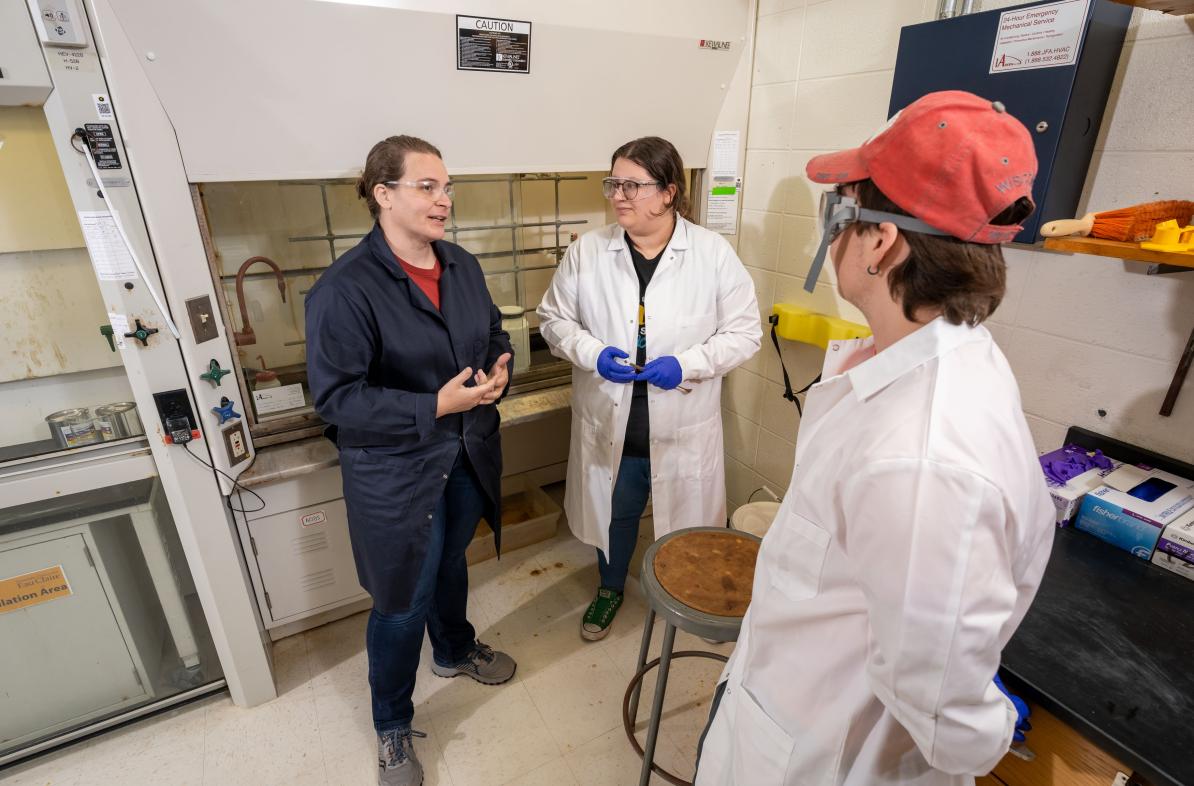WPC Technologies developed a more environmentally friendly anti-corrosion pigment that currently is used on a specific type of aluminum for aircraft. The U.S. Navy contract calls for WPC to develop a similar pigment that can be applied to steel and other types of aluminum to improve the longevity and reliability of military equipment.
“A commercial airliner over its lifetime might get refurbished just once down to the bare metal,” says Brent St.John, chairman and CEO of WPC Technologies. “A military jet carrier aircraft needs to be refurbished on a more frequent schedule because of the harsh conditions.”
UW-Eau Claire and WPC Technologies have connected over the years as Blugolds have interned at the manufacturer, and alumnus Eric Colwitz, a December 2020 chemistry graduate, is a full-time chemist at the company. St.John says UW-Eau Claire is an attractive partner for the project because the university has the testing equipment for chemical analysis and is educating student chemists on the company’s quality control testing protocols.
“We like UW-Eau Claire’s approach with the way they deal with commercial companies. The scale of Dr. Gerlach’s lab fits our project and we need a steady stream of good chemists,” St.John says. “I hate using the phrase ‘win-win,’ but it really is. It’s a chance for students to see a real-world application for what they work on in class at the university.”
Gerlach, who has a Ph.D. in inorganic chemistry, says Blugold undergraduates are the “boots on the ground” for the project, testing and working to optimize a mixture that uses WPC’s newest anti-corrosive pigments to meet company and government standards.
“There are many properties of the formulation that need to meet qualifications necessary for sea- and aircraft,” Gerlach says. “Students will be part of identifying the variables that will produce a viable formulation for the new anti-corrosive pigments.”
Bradley, a fourth-year student from Hurley majoring in chemistry, runs experiments to test and analyze certain qualities of the materials and reports the results to WPC. Bradley was interested in the project because she wanted to learn about industry partnerships and gain experience in inorganic/organometallic materials.
Bradley also gained experience and learned about time management and communication in the paint and coatings industry.
“This type of research is more than I could have hoped to find at UW-Eau Claire because of the people I’ve gotten to meet and the experiences I’ve gotten to have with different spectroscopy methods and techniques,” says Bradley, who plans to attend graduate school for inorganic chemistry in hopes of becoming a chemistry professor.
UW-Eau Claire and WPC are six months into the two-year project and St.John is satisfied with the technical progress. St.John is hopeful that his company’s collaborative research with UW-Eau Claire will continue in the future.
“Our goal is for every year to be a partner for the Department of Defense and whatever the project is, to have UW-Eau Claire as a key partner and keep this thing going as long as possible,” St.John says. “It’s good for everyone, including the state of Wisconsin.”
In 2023, UW-Eau Claire received a $400,000 National Science Foundation grant through the Enabling Partnerships to Increase Innovation Capacity program to increase industry collaboration. The defense department-funded project allows the university to further expand its relationships with regional and state industries.
Gerlach’s collaboration with WPC Technologies “exemplifies the significant benefits of industry partnerships,” says Dr. Doug Dunham, interim director of strategic partnerships and program development at UW-Eau Claire.
“These collaborations provide students with valuable technical skills and knowledge, keep faculty informed about current industry needs and advance the industrial partners' research and development objectives,” Dunham says. “Industrial partnerships are crucial for developing a well-prepared workforce and boosting economic development.”



